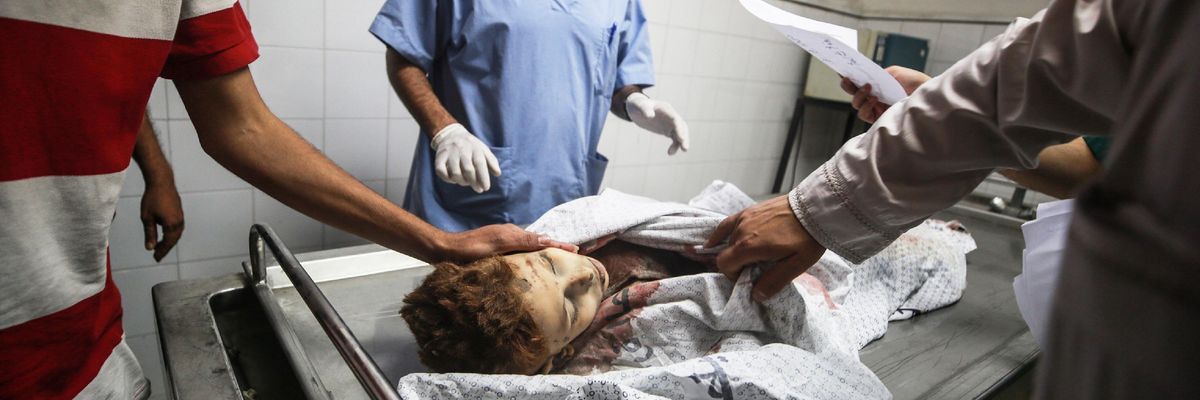Two months after manifestly savage Israeli air strikes buried entire families under rubble - One doctor: "It's deliberate - they want to kill the people of Gaza" - besieged Gazans continue to insist "living is a non-negotiable right" despite a 15-year, violence-punctuated blockade that has brought homelessness, shortages, soaring unemployment and an entire population of traumatized children who've become, by age nine or so, unwilling experts at identifying disparate munition blasts. Says one resident, "Our children have not seen a beautiful day in 15 years." Thanks to U.S. funds, the May attacks made life yet more hellish in the world's largest open-air prison. Air strikes killed at least 256 Palestinians, including 66 children, injured over 1,900, including 61 children, and destroyed or damaged 525 businesses, infamously including the al-Walid commercial hub that held thriving shops, a press office, an education center: "There was nothing there that threatened Israel. In one moment, everything was lost." With "no place safe in Gaza," one of the most devastated was a foundering healthcare system that Israel, in a particularly brazen war crime, deliberately targeted. Long facing a lack of supplies, sporadic electricity, COVID, an apartheid-level lack of vaccines and deficits from 15 years of siege that doctors say cost them 150 years of medical progress, the calculated honing in on hospitals, clinics and doctors themselves was meant, said one doctor, "to increase the overwhelming of the already overwhelmed healthcare system."
And it did. At least 18 hospitals or clinics were bombed, including the main COVID clinic and the only lab doing COVID tests; Israel also purposely bombed the main roads to Shifa Hospital to delay ambulances carrying the wounded. Amidst bombardments, 24-hour shifts and anxiety about their own families at home, doctors described"nightmare" hospital scenes of waves of bloodied women, children with horrific wounds - they saved an 11-year-old with shrapnel lodged in his aorta, but he died two days later from head and chest wounds - and screaming relatives. Even seasoned doctors said the bombings were especially brutal - "They aim to kill" - with two senior doctors targeted and killed. So were entire families, buried in the rubble of their homes, "wiped off the face of the earth," said one doctor. From one family, he saw two brothers, three and seven, arrive in an ambulance: "It was clear to me they were both dead. Their bodies crushed and burned." Their wounded father arrived, asking for his children; another ambulance brought their 10-year-old sister, who died; three more brothers, put into intensive care; their mother in the waiting room, barely able to stand; another ambulance with their cousin, who'd already rented a hall for his upcoming wedding. He too died. "It (was) as if the end of days was upon us. When you see things like that, your heart turns over."
Today, after untold grief and losses of up to $570 million, Gazans remain trapped by walls and checkpoints; unemployment has surged to 70%; over half the populace live in poverty; all live under an Occupation that controls even the food they eat: "We are at the mercy of the Israeli government - they even put us on a diet." But Gazans, fiercely resilient, also remain adamant "we want our basic human rights - we want to live." And remarkably, a new generation is determined to make life better for too many scarred others by becoming doctors, "because people here are in need of people who can help them." With crossings and foreign scholarships largely closed to them, most medical students go to the Islamic University of Gaza; their six-year program costs $4,000 a year, about double the average salary of Gazans lucky enough to have any work. Of this year's class of 123 last-year students, the Medical Students Union says 73 cannot pay the remaining tuition to allow them to graduate this month. Each owes an average of $3,500, for a total of $258,000. To help, the Union has launched a crowdfunding campaign to raise an initial $30,000. "73 isn't just a number," they note. "Each student has a story of suffering with their families." Nour's father is a farmer, but the Israeli assault destroyed their land and Nour's goal of being a doctor; Hussain's father had a stroke and lost his job; Alaa cites "six years of fatigue and struggle" as, "All of us have pursued our dream of practicing medicine and taking care of our people, (and) now it may come to nothing. But we will not give up hope." Lend a hand; all things considered, it's a modest mitzvah.

